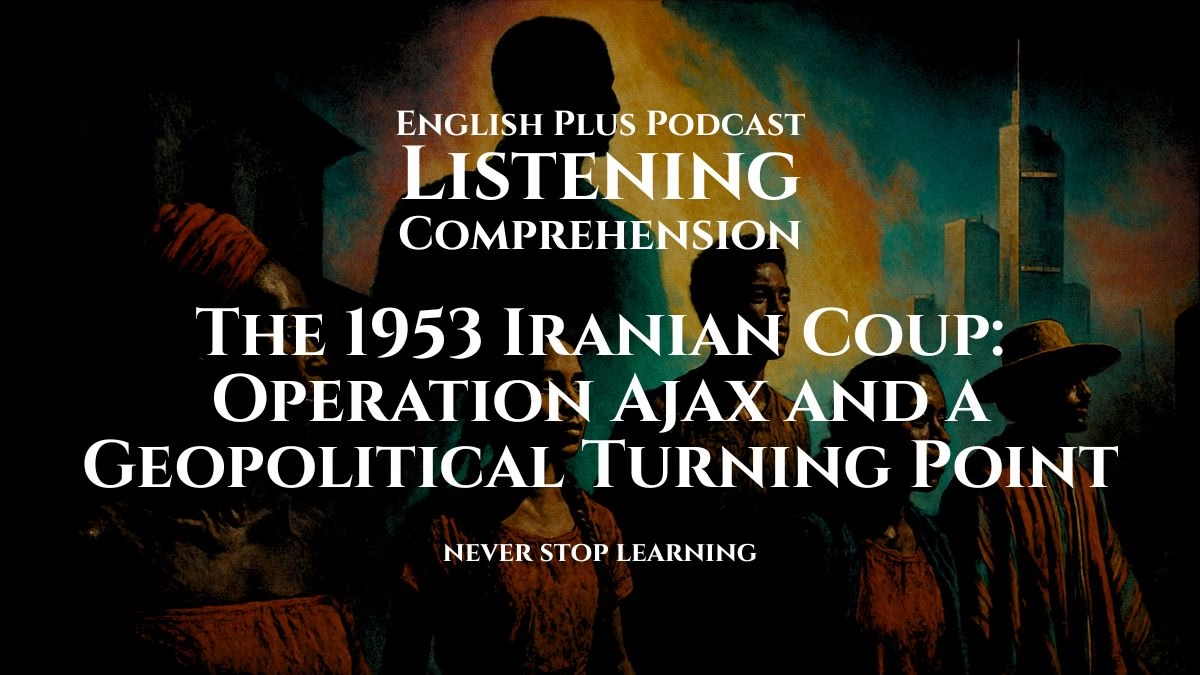Listening Skills for Exam Success
Welcome to this listening practice. The lecture you are about to hear is an academic monologue. This is a common format on international exams, and it tests one main skill: your ability to follow a complex, structured argument. Unlike a dialogue, a monologue doesn’t have conversational cues to break up the information.
Here are a few tips to help you succeed:
- Listen for the Narrative Structure: This lecture is a story told in chronological order. It explains a cause-and-effect chain of events. Your goal is to identify this chain. Listen for signpost words that signal time (“First,” “By 1951,” “Following this”) and causation (“As a result,” “Therefore,” “Consequently”).
- Focus on the “How and Why”: The prompt for this lecture is about the “how and why.” Don’t just listen for what happened, listen for why it happened. Create a “cast of characters” in your notes (e.g., Mossadegh, UK, US, Shah) and write down their motivations.
- Practice “Concept Note-Taking”: At 1500 words, this is a long lecture. You cannot write down every fact. Listen for the main concepts. For example, when you hear “Anglo-Iranian Oil Company,” “profits,” and “nationalization,” your note should just be: UK (AIOC) unfair $\to$ Iran nationalizes. This is far more effective than trying to write down the exact profit-sharing percentages.
- Identify the Thesis: The speaker will have a main argument, or thesis, which will be introduced near the beginning and restated in the conclusion. Try to identify this main idea, as it’s the “umbrella” that all other facts will huddle under.
Topic Introduction
You are about to hear a university lecture on a pivotal, and for many, a controversial event of the 20th century: the 1953 overthrow of Iran’s democratically elected Prime Minister, Mohammad Mossadegh.
Before you listen, think about this: What happens when a developing nation tries to take control of its own valuable natural resources? And what happens when this action takes place during the intense, paranoid atmosphere of the global Cold War? This lecture explores that exact intersection of nationalism, economics, and geopolitical strategy.
Key Vocabulary and Phrases
Here are 12 advanced terms from the lecture. Understanding them is key to understanding the speaker’s main points.
Nationalization (n.): The act of taking an industry or asset (like an oil company) from private ownership and putting it into state or government ownership.
How it’s used: This is the central event. The lecturer explains that Mossadegh’s move to nationalize the Anglo-Iranian Oil Company was the trigger for the entire crisis.
Sovereignty (n.): The full right and power of a governing body over itself, without any interference from outside sources.
How it’s used: The speaker presents Mossadegh’s legal argument: that sovereignty gave Iran the right to control its own oil, just as Britain controlled its coal.
Grievance (n.): A real or imagined wrong or other cause for complaint or protest; a deep-seated feeling of resentment.
How it’s used: The speaker describes the unfair oil deal as the primary grievance of the Iranian people, which fueled Mossadegh’s popularity.
Embargo (n.): An official ban on trade or other commercial activity with a particular country.
How it’s used: The lecturer explains Britain’s first response to nationalization was a punishing naval embargo, which stopped Iran from selling its oil to anyone.
Pragmatism (n.): A practical approach to problems, focusing on “what works” rather than on fixed theories or morals.
How it’s used: The speaker discusses the shift in American pragmatism: Truman’s (anti-colonial) vs. Eisenhower’s (purely anti-communist).
Geopolitical (adj.): Relating to politics, especially international relations, as influenced by geographical factors and global power struggles.
How it’s used: The lecture frames the coup as a geopolitical event, where Iran was a “chessboard” in the Cold War between the US and the Soviet Union.
Pretext (n.): A reason given to justify an action that is not the real reason; an excuse.
How it’s used: The speaker argues that the “communist threat” (the Tudeh Party) was the pretext for the coup, while the real reason was control of oil.
Clandestine (adj.): Kept secret or done secretively, especially for political or military purposes.
How it’S used: This word describes the secret nature of the plot itself—”Operation Ajax” was a clandestine operation run by the CIA and MI6.
Propaganda (n.): Information, especially of a biased or misleading nature, used to promote a political cause or point of view.
How it’s used: This was a key tool of the coup. The CIA used “black propaganda” to spread fake news that Mossadegh was corrupt and anti-religious.
Autocratic (adj.): Relating to a ruler who has absolute, unchecked power.
How it’s used: The lecture describes the Shah’s rule after the coup as autocratic, contrasting it with the democracy he replaced.
Secular (adj.): Not connected with religious or spiritual matters.
How it’s used: The speaker defines Mossadegh’s government as a secular, nationalist democracy, which is important to distinguish it from the religious government that would follow in 1979.
Consortium (n.): An association of several companies, often formed to undertake a project that is too large for any one company.
How it’s used: The speaker explains that after the coup, the oil was not returned to Britain but was given to a new consortium of Western (British, American, and Dutch) companies.
Listening Audio
Listening Transcript: Please do not read the transcript before you listen and answer the questions.
Our topic today is a single event in 1953 that, in many ways, drew the map for the next 70 years of political relationships in the Middle East. I’m referring to the overthrow of Iran’s first democratically elected Prime Minister, Dr. Mohammad Mossadegh, in a clandestine operation known as “Operation Ajax.”
To understand the complex relationship between Iran and the West, particularly the United States and Great Britain, one cannot ignore these events. The 1979 Islamic Revolution, which is often seen as the start of the modern conflict, is, in the eyes of many historians and Iranians, the end of a story that began in 1953. This lecture will focus on the “how and why” of this 1953 coup, looking at the motivations of the three main actors: Iranian nationalism, British imperial interests, and American Cold War geopolitical strategy.
First, let’s set the stage. The story begins, as it so often does, with a natural resource: oil. By the mid-20th century, Iran’s economy was dominated by a single entity: the Anglo-Iranian Oil Company, or AIOC. This company, which we know today as BP, was majority-owned by the British government. And the terms of its deal with Iran were, by any modern standard, astonishingly one-sided.
The AIOC operated a massive refinery in Abadan—then the largest in the world. It paid almost nothing in taxes to the Iranian government. Britain, for example, received more in taxes from the AIOC’s profits than Iran received in total revenue for its own oil. The company operated as a state within a state, with segregated towns for its British and Iranian workers, and it refused to open its books to Iranian government auditors. This was the central, burning grievance of the Iranian people.
Into this picture steps Dr. Mohammad Mossadegh. It is vital to understand who he was. He was not a cleric. He was not a communist. He was a wealthy, European-educated, secular nationalist and a passionate democrat. He was also, by all accounts, highly charismatic, known for his emotional speeches and for receiving foreign diplomats in his pajamas from his bed. In 1951, his “National Front” movement championed a single idea: nationalization. The idea that Iran’s oil should belong to the Iranians.
This idea was electrifyingly popular. The Iranian Majlis, or parliament, passed the nationalization bill unanimously, and Mossadegh was swept into the Prime Minister’s office.
For Britain, this was a catastrophe. The AIOC’s profits were, quite literally, propping up Britain’s post-World War II economy. Prime Minister Clement Attlee’s government immediately and aggressively retaliated. Their first move was economic warfare. The Royal Navy instituted a crushing embargo, a blockade that stopped any tanker from leaving Iran’s ports. They froze Iranian assets. Iran had the oil, but it could not sell a single drop. The Iranian economy, deprived of its only real source of revenue, began to spiral into chaos.
Britain also took legal action, which Mossadegh famously rebutted. He argued at the UN and the International Court of Justice at The Hague, making a simple, powerful case: this was a matter of national sovereignty. He argued that Britain had nationalized its own coal and steel industries, and Iran, as a sovereign nation, had the right to do the same. He won. The court ruled it had no jurisdiction.
Having failed legally and economically, Britain turned to a more covert solution. MI6, their intelligence service, began to formulate a plan for a coup d’état. But they knew they couldn’t do it alone. They needed a more powerful partner. They needed the United States.
This is the most critical pivot in the story. Britain first appealed to President Harry Truman. Truman, however, was a firm anti-colonialist. He saw the crisis exactly as Mossadegh did: as a case of British imperialism. He refused to help, fearing that a coup would, in fact, push Iran into the arms of the Soviet Union.
But in 1952, there was a change in Washington. The Eisenhower administration came to power, and with it, two of the most influential anti-communists of the era: the Dulles brothers. John Foster Dulles became Secretary of State, and Allen Dulles became the Director of the brand-new CIA.
This new administration had a very different sense of pragmatism. They viewed the world almost exclusively through the lens of the Cold War. For them, every local nationalist movement was a potential gateway for communism.
The British government, now under Winston Churchill, understood this. They changed their argument. They stopped talking about “our lost oil profits” and started talking about “the communist threat.” Their “proof” was the Tudeh Party, Iran’s communist party. As the British embargo strangled Iran’s economy, unemployment and poverty soared, making the Tudeh Party more popular. The British, in effect, created the very crisis they now warned against.
This was the pretext the Dulles brothers needed. They were convinced, or allowed themselves to be convinced, that Mossadegh was either a secret communist or was too weak to stop a Tudeh takeover. The fall of Iran, they argued, would give the Soviets a “warm water port” and control of the Middle East’s oil. The decision was made. Operation Ajax was approved.
The CIA’s man on the ground, Kermit Roosevelt Jr.—a grandson of Teddy Roosevelt—was given a budget of one million dollars and a simple objective: remove Mossadegh and re-install the young, compliant monarch, Mohammad Reza Pahlavi, as the true leader of Iran.
The plan was a complex mix of propaganda and bribery. The CIA and MI6 used their networks to bribe journalists, clerics, and politicians to spread “black propaganda”—fake news stories that Mossadegh was not only pro-communist but also anti-religious and secretly corrupt. They sowed dissension within his political coalition.
The linchpin of the plan was to get the Shah to sign two firmans, or royal decrees: one dismissing Mossadegh, the other appointing the CIA’s chosen replacement, General Fazlollah Zahedi.
The coup was set for August 15th, 1953. But it failed. Mossadegh’s loyal intelligence chief learned of the plot. When the Shah’s envoy delivered the decree, he was arrested. Mossadegh went on the radio and announced a coup attempt had been thwarted. The Tudeh Party flooded the streets, celebrating the victory. General Zahedi went into hiding. And the Shah, terrified, fled the country, first to Baghdad and then to Rome. It looked, for all the world, like Mossadegh had won.
In Langley and London, the order was given: “Abort the mission.”
But Kermit Roosevelt, in Tehran, made a fateful decision. He ignored the order. He still had millions in cash. And he saw an opportunity in the chaos. He decided to double down.
He and his team took the Tudeh supporters’ victory celebrations and turned them into a weapon. They used their remaining funds to hire their own mobs—paid street thugs, wrestlers, and circus performers—to rampage through Tehran on August 16th and 17th. Critically, these mobs pretended to be Tudeh supporters. They smashed shop windows, attacked mosques, and shouted pro-communist slogans, all while praising Mossadegh.
The propaganda campaign had worked. The secular middle class, the business owners, and the religious establishment were now terrified, believing a communist takeover was imminent. The military, which had been on the fence, was now convinced that Mossadegh had lost control.
On August 19th, the final phase began. The CIA’s paid agents, now joined by legitimate anti-communist protestors and the military, converged on Mossadegh’s home. After a brief but intense battle, his government fell. General Zahedi emerged from hiding to take power. The Shah was flown back from Rome and restored to the Peacock Throne. Mossadegh was arrested, put on trial for treason, and lived the rest of his life under house arrest.
The coup was a “success.” But what was the aftermath?
The Shah’s rule, for the next 25 years, was autocratic. He had been re-installed not by his people, but by foreign powers, and he ruled accordingly, with his power enforced by his notorious secret police, the SAVAK. He became America’s staunchest ally in the Cold War.
And the oil? It was “de-nationalized.” But it wasn’t returned to Britain. A new consortium was formed. British Petroleum (the former AIOC) had to settle for a 40% stake. The other 60% was divided, with American companies getting 40%. The United States, which had no stake in Iranian oil before 1953, was now a dominant player.
In conclusion, Operation Ajax was a short-term tactical victory for the West. It secured the oil and created a “pillar” of anti-Soviet stability. But it did so by destroying Iran’s secular democratic movement. It planted a deep and bitter grievance in the Iranian psyche, a memory of foreign interference that directly fueled the anti-Western, anti-Shah, and anti-American fury of the 1979 Islamic Revolution. The 1953 coup is a profound lesson in “blowback”—where a short-term, clandestine solution creates a far larger, long-term strategic problem.










0 Comments